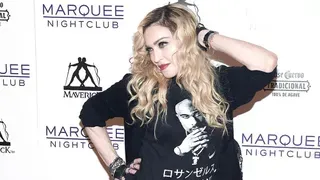October 11, 2010
Sexy Vegan Joshua Katcher : Fighting for the Rights of Those Who Can't
Mark Thompson READ TIME: 11 MIN.
Some people wear their hearts on their sleeves - and then there's Joshua Katcher, the vegan animal rights activist whose arms are enveloped by a multi-hued tapestry of avian tattoos. "My tattoos are birds that have gone extinct over the past three hundred years," says Katcher, "so my tats are kind of a memorial, but also a reminder to keep focused."
With that kind of focus, it's small wonder that throughout our nearly three-hour brunch at Caf� Blossom on Manhattan's Upper West Side, the effervescent and darkly handsome Katcher is repeatedly recognized by the vegan restaurant's patrons and those who come in from the street.
Ever since the New York-based Katcher launched his website, The Discerning Brute ("Fashion, Food, and Etiquette for the Ethically Handsome Man"), in 2008, Katcher's public persona has been increasingly displayed in the media spotlight, including a two-page nude centerfold for Time Out New York's HORNY issue. Featured on Oprah.com as a "vegan superstar," Katcher was also named "The New Sexy Vegan," by UK's The Guardian, as part of their list of new faces and top trends for 2010.
It was in 1951 that the Vegan Society defined veganism as "the doctrine that man should live without exploiting animals," which today is widely understood to mean the avoidance of all animal products, either through ingestion or by adornment. Raised in Poughkeepsie, New York, Katcher became a vegan in high school after witnessing a film on slaughterhouses. What was originally a weeklong commitment by Katcher and his secondary school classmates has become Katcher's raison d'�tre as a man. "One of the most tortured existences is to have values - and not live by them," says Katcher, quoting a maxim that has becoming something of his mantra.
"Fur is not fabulous. There’s something wrong if the most luxurious items in fashion are dead animals."
An afternoon spent with Katcher produces a flurry of (often irrefutable) philosophical apothegms - and I scribbled furiously to capture as many of them as I could, while eating, chewing, and swallowing. "So many people are searching for signs of life in the universe," says Katcher, holding up the recent Style issue of The New Yorker, the one with the satirical cover of animals in fur coats parading down a catwalk, thereby illustrating the absurdity of one animal wearing another animal's fur. "And here we are destroying our own companions on the planet. Why would meeting an alien be any different from the sentient beings, the many species that already surround us?"
As an artist, activist, vegan chef, and MTV television producer, Katcher's most recent endeavor is The PINNACLE Initiative, his forum for re-energizing the 1970s NO FUR pin (with its slogan "Real people wear fake fur"), which was arguably the precursor to the AIDS ribbon and its multiple awareness accessory variants. "The fur issue is one of the oldest issues within the animal rights movement. There's such an indifference to the suffering of fur animals. Fur is not fabulous. We have to talk to the industry; we have to make them see. I want people to be accountable, to know where what they're wearing is coming from - and to know that they are responsible whether they like it or not. There's something wrong if the most luxurious items in fashion are dead animals."
And Miss Jackson - how does Katcher feel about Miss Nasty's recent twin massive Blackglama billboards in Times Square, with Miss Jackson wearing only dead animals? "I mean, you can take this to the limit... I mean, as a Jew, our hair was stuffed into mattresses; our fat was used for soap. So, tell me, where does it end?"
And what about faux fur, or recycled fur? As Katcher explains, "If you make something desirable, it creates demand. So if you're wearing faux fur, then you need to showcase the NO FUR pin."
"I'm using the same imagery as the industry: something that can be captured in a picture," says Katcher about The PINNACLE Initiative. "Peter Max is going to be doing a pin. And John Bartlett - he's recently gone vegan. Ultimately, the truth is hard to silence. People are openly talking about the fur industry now."
Or as Jonathan Safran Foer wrote in Eating Animals, "We can not plead ignorance, only indifference."
"Fashion isn’t only frivolous; it’s also a powerful visual communicator."
For the sartorially astute Katcher, fashion has always been a conduit for his activism. As a student at Syracuse University, he recalls, "I was reading a lot about the police state and thinking about how uniforms carry a lot of weight. Military uniforms, for example, are about power and intimidation. The gun - most often it's not used; it's more of an accessory. It's displayed for a reason. Even with a suit and tie, you take on some of that intimidation; it's about power. Fashion isn't only frivolous; it's also a powerful visual communicator. Fashion really owns the visual aesthetic language."
For Katcher, the understanding of fashion's power enabled his own transition into an ethical Beau Brummell. "My interest in fashion is a consequence of my activism," he says. "Fashion has always been a tactical approach to activism. I realized that I didn't look like someone that you'd want to take advice from, so I had to 'tailor' my message to the tastemakers. Today, it's necessary to embrace the truth of fashion: how you look while you're saying something. It's like, 'Here are these cops' - and people listen."
"Fashion is both superficial - and functional. The thing about the fashion industry is that it knows how to manipulate our desires. It's about power - what you wear is like a victory flag wrapped around yourself."
For many young gay men, fashion has often provided camouflage for their nascent desires, and as Katcher concurs, "I was vegan before I was out as gay. I was terrified; I felt I had totally compromised my manhood by being vegan - and then I was gay, too."
While it hurts to hear, on the other hand, Katcher's experience as a closeted gay man still mirrors what too many young gay men face today - even in an era of increasing LGBT visibility. "My awareness of gayness was so limited. I was into punk - and so what I saw in the gay group, I thought, 'That's not who I am.' So, for me, knowing I was gay was a source of sadness and depression. One of my first crushes was a boy dancer at my bar mitzvah." Katcher laughs as he recalls recently viewing home videos of that event. "It's so funny," he says, grinning, "but all through the movie, you can see my head turning and my eyes totally watching this guy dancing."
Ultimately, it was Katcher's sister who came out first. "My sister beat me to the gay alter," he says, laughing. "I beat her to veganism, but she beat me to coming out."
"What would I want others to do if I couldn’t represent myself?"
Vegetarianism has been a part of humanity for at least as long as Homer; in The Odyssey, for example, Odysseus comes upon the island of Lotus-eaters, a fact also referenced by Herodotus who encounters a similar tribe in North Africa eating only the fruits of the lotus plant. Historically, vegetarianism has been connected with cultural reform movements, such as public health, temperance, and anti-vivisection.
When asked if he sees any parallels between the pursuit of LGBT equality and the animal rights movement, Katcher replies, ""One of the difficulties in the animal rights movement is getting people to feel true empathy. It's getting people to ask themselves, 'What would I want others to do if I couldn't represent myself?'"
"As gay people," Katcher continues, "we should be more aware of the oppression of other groups that are not in positions of power. Animals cannot organize like gay people - yet they still have families and friends. We should be more aware of the oppression of others because we should be informed by what has happened to us throughout history - and not be silent about it. It's like the slogans SILENCE = DEATH and NEVER FORGET; it's liberating to look at those slogans because you realize those slogans were always intended to transcend their timeliness. They speak to the future."
Speaking of the future, a 2010 report from United Nations Environment Program's (UNEP) International Panel for Sustainable Resource Management advocated a "global shift toward a vegan diet," contending that a vegan diet was critical for mitigating global issues of hunger and the damaging aspects of climate change. Recent studies have calculated that upon switching from the average American diet to a vegan diet, a person reduces his/her CO2 emissions by one and a half tons (3,000 pounds) per year.
Furthermore, on average, vegans have a lower body mass index than omnivores, which has also meant lower rates of heart disease, hypertension, type 2 diabetes, prostate and colon cancers. And yet, less than one percent of the American population identifies as vegan, about which Katcher says, "When you mention veganism to people, asking them to think about it, sometimes people have a panic attack. When, really, what you want to recommend to them is to try it out for three or four days. Or one day a week. Or go vegan for one whole week - and see how you feel. Feel the difference."
Several studies have determined that vegetarians scored lower on depression tests and had better mood profiles. "What's great about veganism is that it's not only better for the environment," says Katcher, "but it's also great for your health. I mean, you don't get a package like that too often."
Perhaps, as with everything else in a capitalistic culture, veganism has to be sold to the population at large - and with that thought, Katcher starts riffing on possible vegan advertising slogans. "It's like, you know, as gays, you could say 'Solving the population crisis - one homo at a time,'" he says, grinning, "So how about 'Go vegan - because you weren't already weird enough.'"
And as for garnering media attention, what's better than having a former US President announce his recent conversion to a vegan diet - just as Bill Clinton did recently.
It was Leo Tolstoy who wrote, "As long as there are slaughterhouses, there will be battlefields."
"It takes a bit of an adventuresome spirit to be vegan," continues Katcher. "People feel like going vegan is sacrificing pleasure. I have such a problem with that; for me, I like to think of veganism as conscientious hedonism. I enjoy food so much more, knowing that no one is getting hurt - and that heightens your pleasure. Veganism heightens pleasure. And I know because I'm a total aesthete."
It has been estimated that if all the grain used to fatten up US livestock were instead consumed by people, it would feed 800 million. And yet, as Katcher contends, "People are so afraid. They think if they make a change, they have to change everything in their life. It becomes overwhelming for them. But the thing is, veganism is not about being Puritanical."
According to a 2009 by the World Bank, livestock and their byproducts account for 51% of worldwide greenhouse gas emissions, with animal agriculture directly attributable to water pollution, land deterioration, and climate change; in short, the livestock industry is one of the top three most serious contributors to environmental degradation. As Katcher says, "You have people arriving in positions of power, but without an articulated vision of the future. David Orr in Down to the Wire: Confronting Climate Collapse wrote something about how the US is in a perpetual state of infantile self-gratification. In this country, in this culture, we are encouraged to be selfish."
One study recently concluded that going vegan one day a week would do more for the environment than the entire locavore movement. And lest we forget, it was Leo Tolstoy who wrote, "As long as there are slaughterhouses, there will be battlefields."
As a teenager, Katcher recalls, "I read comic books; they set me up for a world of heroes and justice." Perhaps it's only fitting then that, as an adult, Joshua Katcher has become the Crusading Avenger for animal rights - with ethics and handsome outfits every bit as forceful as any superhero's powers.
____________________________________________________________________________
"It's the duty of every vegan to know how to cook - and especially because nothing is more convincing than good food," says Joshua Katcher. That said, here's a short (alphabetical) list of Katcher's favorite NYC restaurants:
3 Brothers Pizzeria: http://www.scribd.com/doc/23315444/vegan-menu
Atlas : http://www.atlascafenyc.com/
Boneshakers : http://brooklynboneshakers.com/
Cinnamon Snail (Hoboken) - http://www.cinnamonsnail.com/
Bliss : http://nymag.com/listings/restaurant/bliss/
Blossom Restaurant / Cafe Blossom : http://www.blossomnyc.com/site/
Candle 79 / Candle Cafe : http://www.candlecafe.com/
Cocoa V : http://www.cocoav.com/
Hangawi : http://www.hangawirestaurant.com/
House of Vegetarian - http://nymag.com/listings/restaurant/house-of-vegetarian/
Kaijitsu - http://www.kajitsunyc.com/
Lula's Ice Cream : http://www.lulassweetapothecary.com/
NY Dosas: http://supervegan.com/r.php?id=113
Pure Food & Wine: http://www.oneluckyduck.com/purefoodandwine/
Sacred Chow: http://sacredchow.com/
Soy & Sake (Vegan Sushi) - http://www.soyandsake.com/
Uptown Juice Bar: http://www.uptownjuicebarny.com/
Joshua Katcher Links:
The Discerning Brute: http://www.thediscerningbrute.com/
The PINNACLE Initiative : http://www.ReinventTheicon.com
Gracious Gourmand: NYC-based, biweekly vegan dinner event : http://www.thediscerningbrute.com/graciousgourmand/
A long-term New Yorker and a member of New York Travel Writers Association, Mark Thompson has also lived in San Francisco, Boston, Provincetown, D.C., Miami Beach and the south of France. The author of the novels WOLFCHILD and MY HAWAIIAN PENTHOUSE, he has a PhD in American Studies and is the recipient of fellowships at MacDowell, Yaddo, and Blue Mountain Center. His work has appeared in numerous publications.







